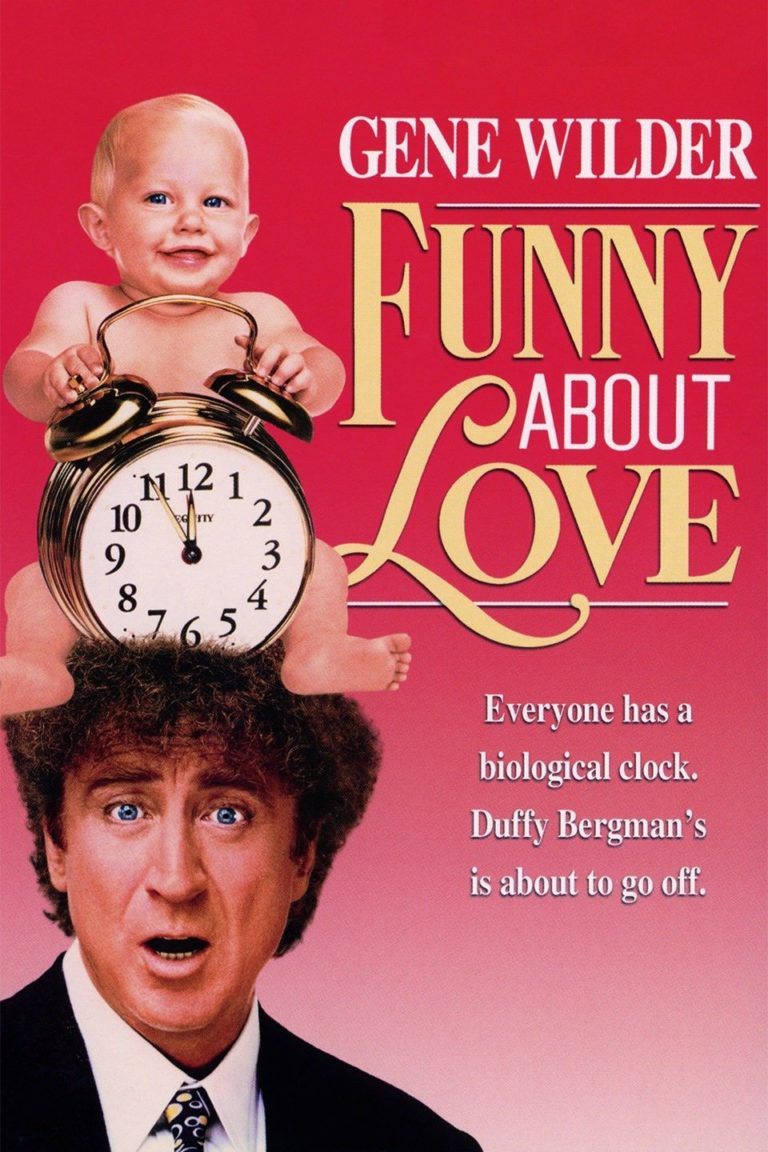
| None | Light | Moderate | Heavy | |
|---|---|---|---|---|
| Language | ||||
| Violence | ||||
| Sex | ||||
| Nudity |
Content:
20 obscenities, 3 profanities, implied adultery and promiscuity, and sexual innuendo
More Detail:
FUNNY ABOUT LOVE is a comedy that characterizes the dilemma and frustrations of a married couple unable to conceive. Gene Wilder plays Duffy Bergman, a very successful New York cartoon satirist whose uncertainty about becoming a father makes his life completely unpredictable. When he meets Meg, a hardworking caterer, he discovers the love of his life, and they marry.
Yet, love alone isn’t enough to make them happy. Meg decides she wants a baby, a goal that makes Duffy frantic. At this point, what’s funny about love is how inopportune it can be (the fulfillment of the first of a three-part premise).
Meg and Duffy go from doctor appointment to doctor appointment, from one home remedy to the next, but are simply unable to conceive. By the time parenthood becomes Duffy’s most important desire, Meg is concentrating on her career. Thus, what’s next funny about love is how ironic it can be.
Eventually, disappointment engulfs them. Meg and Duffy blame each other, until it’s decided to throw all their energies into their careers in order to relieve the pressure. Career success, however, offers short term relief, but long term disaster. Tired of the disappointment associated with her infertility, Meg opens her own restaurant. Duffy still has hope, but, since neither have faith, Meg leaves Duffy. Sadly, they divorce.
Duffy vainly attempts reconciliation, but Meg, whose heart is set on her successful business, will have nothing to do with a reunion. Duffy learns that what’s funny about love is how incomprehensible it can be, when he, lonely and distraught, meets Daphne, a young, attractive, uninhibited and “liberated” sports writer. Slowly, joy and contentment seem to re-enter Duffy’s life, but, in reality, this is an all too common occurrence to grab at anything when one is, as the saying goes, “on the rebound.”
At any rate, Daphne is infatuated with Duffy’s success and status, and Duffy with Daphne’s youth, energy and spontaneity. They move in together, and, after a period of time, Duffy confronts Daphne with his desire for a child. The “fun” stops and Daphne departs, since she wants nothing to do with marriage, or parenthood.
Disheartened and depressed, Duffy seeks out Meg, but she has sold the restaurant and left no forwarding address. Meanwhile, Duffy’s father, shortly after being widowed, becomes engaged to his secretary, Claire, whom Duffy detests.
They marry anyway, and, at the wedding reception, Duffy asks his new stepmother for forgiveness. Meg is also there, and, later, at her new restaurant, he proposes to her again, only this time with no strings attached regarding child bearing. All ends well, as Meg accepts and leads him to the back room, where she shows Duffy a newly adopted baby sleeping in a crib.
To the Christian viewer, the film begs the question of why such an obvious solution of adoption was never considered in the first place. Then, the paths that led to divorce and promiscuity would not have been explored. To a non-believing world, though, this is the way that seems logical to go.
Director Leonard Nimoy adds, “Duffy is a guy who should have grown up some time ago, but like so many of us, he has to be dragged kicking and screaming into maturity.” Gene Wilder further observes that “Duffy is a character who dives heart-first into everything. He is ruled by instinct and emotion.”
From the situations presented, the film attempts to show that what’s funny about love is how inopportune, ironic and incomprehensible it can be. However, keep in mind that these are casual perceptions made from a humanistic point of view. Christians know that these kind of trials come into our lives for other reasons: to teach us the importance of self-sacrifice, to learn from our mistakes, or to say “no” to temptation.
One point worthy of mention is that only a handful of obscenities occur, rather than the plethora of obscenities that so often inundate films today. Please be cautioned about these, as well as instances of sexual innuendo and promiscuity. Even without these negatives, FUNNY ABOUT LOVE is still fair-to-good, because it leaves the viewer with a very good feeling at the end.
Yet, love alone isn’t enough to make them happy. Meg decides she wants a baby, a goal that makes Duffy frantic. At this point, what’s funny about love is how inopportune it can be (the fulfillment of the first of a three-part premise).
Meg and Duffy go from doctor appointment to doctor appointment, from one home remedy to the next, but are simply unable to conceive. By the time parenthood becomes Duffy’s most important desire, Meg is concentrating on her career. Thus, what’s next funny about love is how ironic it can be.
Eventually, disappointment engulfs them. Meg and Duffy blame each other, until it’s decided to throw all their energies into their careers in order to relieve the pressure. Career success, however, offers short term relief, but long term disaster. Tired of the disappointment associated with her infertility, Meg opens her own restaurant. Duffy still has hope, but, since neither have faith, Meg leaves Duffy. Sadly, they divorce.
Duffy vainly attempts reconciliation, but Meg, whose heart is set on her successful business, will have nothing to do with a reunion. Duffy learns that what’s funny about love is how incomprehensible it can be, when he, lonely and distraught, meets Daphne, a young, attractive, uninhibited and “liberated” sports writer. Slowly, joy and contentment seem to re-enter Duffy’s life, but, in reality, this is an all too common occurrence to grab at anything when one is, as the saying goes, “on the rebound.”
At any rate, Daphne is infatuated with Duffy’s success and status, and Duffy with Daphne’s youth, energy and spontaneity. They move in together, and, after a period of time, Duffy confronts Daphne with his desire for a child. The “fun” stops and Daphne departs, since she wants nothing to do with marriage, or parenthood.
Disheartened and depressed, Duffy seeks out Meg, but she has sold the restaurant and left no forwarding address. Meanwhile, Duffy’s father, shortly after being widowed, becomes engaged to his secretary, Claire, whom Duffy detests.
They marry anyway, and, at the wedding reception, Duffy asks his new stepmother for forgiveness. Meg is also there, and, later, at her new restaurant, he proposes to her again, only this time with no strings attached regarding child bearing. All ends well, as Meg accepts and leads him to the back room, where she shows Duffy a newly adopted baby sleeping in a crib.
To the Christian viewer, the film begs the question of why such an obvious solution of adoption was never considered in the first place. Then, the paths that led to divorce and promiscuity would not have been explored. To a non-believing world, though, this is the way that seems logical to go.
Director Leonard Nimoy adds, “Duffy is a guy who should have grown up some time ago, but like so many of us, he has to be dragged kicking and screaming into maturity.” Gene Wilder further observes that “Duffy is a character who dives heart-first into everything. He is ruled by instinct and emotion.”
From the situations presented, the film attempts to show that what’s funny about love is how inopportune, ironic and incomprehensible it can be. However, keep in mind that these are casual perceptions made from a humanistic point of view. Christians know that these kind of trials come into our lives for other reasons: to teach us the importance of self-sacrifice, to learn from our mistakes, or to say “no” to temptation.
One point worthy of mention is that only a handful of obscenities occur, rather than the plethora of obscenities that so often inundate films today. Please be cautioned about these, as well as instances of sexual innuendo and promiscuity. Even without these negatives, FUNNY ABOUT LOVE is still fair-to-good, because it leaves the viewer with a very good feeling at the end.







